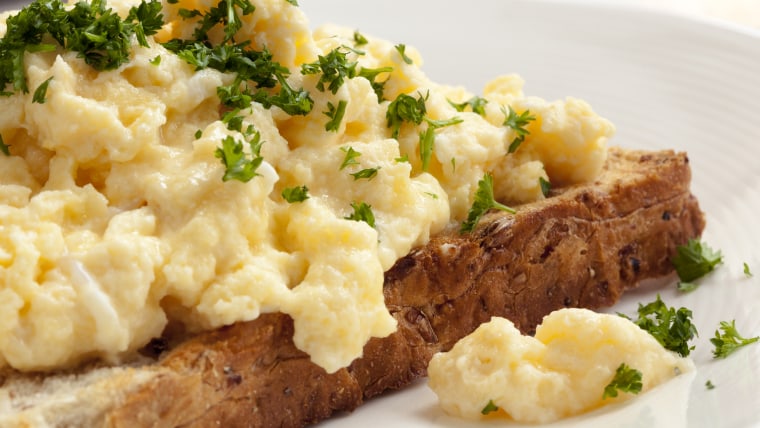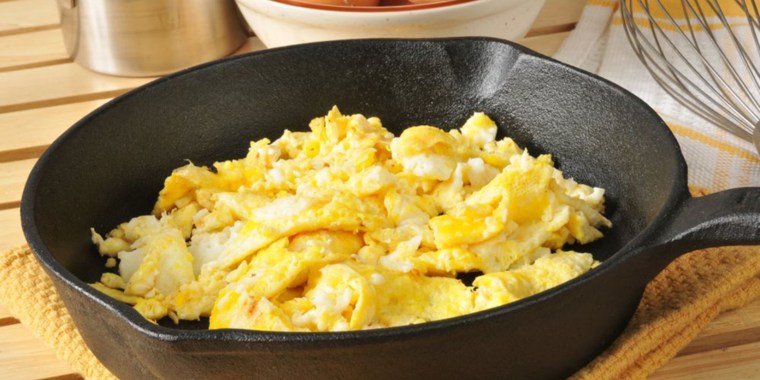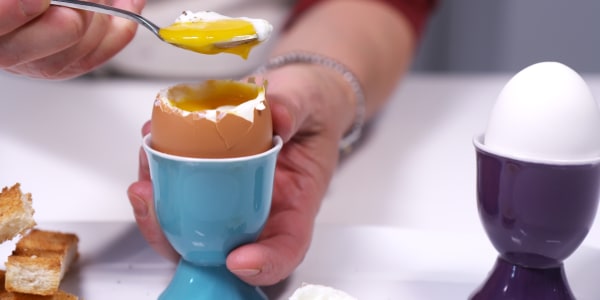A beautiful plate of fluffy scrambled eggs is a wonderful way to start the day.
But a plate full of mushy curds sitting in water definitely isn't so appetizing.
Eggs are one of the most versatile and nutritious proteins out there, but they can be surprisingly easy to mess up if you don't know what you're doing. TODAY Food caught up with several chefs (let's call them "eggs-perts") to find out how to fix seven common egg-cooking mistakes.
1. You're overcooking the eggs.

Eggs are two colors: white and yellow. So they should never be cooked until they get dark brown or black (with the exception of crispy edges on a fried egg). "We say this all the time in the restaurants, because most Americans [tend to] overcook their eggs. You see it a lot in an over-stuffed omelet," chef Matt Ayala of Chicago's Cochon Volant Brasserie told TODAY. "For scrambled eggs, turn down the heat and stir consistently! I'd say a majority of people I know are always cooking their scrambled eggs on high heat. A big no-no."
2. You're beating the eggs up.
Don't overbeat — or over-scramble — once your eggs are in the pan. Chef Nick Korbee of Egg Shop in New York City told TODAY that methods like "scrambling eggs in the pan," and not in a separate bowl before they hit the heat, is basically a form of egg cruelty. "This leaves scrambled egg more than shell-shocked, and relegates their otherwise perfect 'eggnatomy' to a lifeless separated mass of mixed proteins and fat."
So how much is too much beating? Be gentle, Korbee advised. "I prefer to scramble eggs with a fork [not a whisk] until well combined, but not fluffy or otherwise aerated." If you're seeing a ton of bubbles in your pre-scrambled eggs, you've probably gone too far.
3. You're cooking eggs on a high heat.
Another common form of egg punishment is something called the "rubber factor," which is the sad result of turning the heat up too much when making eggs. Korbee said that no matter what method you're using, too much heat will cause yolks to become grey and whites will get too firm to be enjoyable. "Gentle heat is best for a very luxurious soft scramble," advised the chef. "This is totally in the hands of the cook, so if your pan is too hot, cook it down by working off the heat or be even more diplomatic and use a double boiler."
4. You're adding eggs to a cold pan.
You don't want a pan that's too hot, but much like Goldilocks and her porridge, a pan that's too cold is also a problem. "Make sure your pan is heated before cooking your eggs," chef Fabio Viviani, a Bravo "Top Chef" alum who owns two restaurants, told TODAY. "If you want scrambled eggs, have your pan be a medium-hot temperature and continuously stir them until [they] thicken." If you're scrambling or frying eggs, add some butter or oil to the pan first. When the butter starts to bubble slightly or the oil sizzles, then you're good to go.
"For an omelet, it is the opposite. Let the eggs sit in the pan until you see bubbles ... then fold," said Viviani. Your pan heat should be at medium.
5. You're adding too many ingredients to the eggs.
"People tend to overcook their scrambled eggs until they are dry and hard so it's best to turn down the flame and add a little bit of liquid, like a tablespoon or two of water," chef David Burke told TODAY. When it comes to making scrambled eggs, the former "Top Chef Masters" contestant actually doesn't think adding milk is a good idea. "Using milk will make scrambled eggs turn brown as the sugar in the milk will cook." Sometimes Burke said he adds a little tomato soup for more flavor.
"When it comes to poaching an egg, home cooks often add too much vinegar and not enough salt," Burke said. "And when trying to get a crispy fried egg, you should use oil instead of butter, since butter has a bit of water in it and oil does not."
6. You're seasoning eggs at the wrong time.
Adding too many ingredients to eggs compromises their taste and texture. But the timing of said seasoning is also critical. "One tip to note for scrambling eggs is to make sure you don’t season the eggs before you start cooking them," said Brent Hudson, an executive chef at New York City's Hole in the Wall. "Adding salt in before the cooking process will break down the eggs and result in a watery scramble."
And if you're poaching eggs, when you add in the vinegar matters, too. "When attempting to poach eggs at home, don't forget to add a splash of vinegar to your simmering water. The vinegar prevents the egg whites from disappearing in your pot," said Hudson.
7. You're storing eggs in the wrong place.
As soon as you get home from the grocery store, be mindful about where you store those fresh eggs. The flavor of eggs can be easily affected by other foods in the fridge — and, unfortunately, those odors can't just be cooked off and a funky fragrance can't be masked with butter. Said Hudson, "Eggs can actually absorb odors via their shells from other foods. So if you’re not storing them in an egg carton, try to keep them away from strong-smelling foods, like seafood." Unless, of course, you enjoy fishy eggs!



